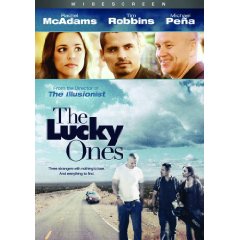 Neil Burger’s compelling drama The Lucky Ones deserved better. When it was released in theaters last year to little fanfare, the movie died quickly and was rushed to DVD before the body was cold. How a film whose director’s previous production, The Illusionist, was a bona fide hit and whose cast includes an Academy Award winner and two rising stars of the next generation of actors could’ve been dropped so quickly is a disgrace. Unfortunately, The Lucky Ones was lumped in with other Iraq War themed movies like In the Valley of Elah and Stop-Loss, films that received a lot of hype and were box office failures. As a result of the disappointing returns of those two films, it would appear that The Lucky Ones‘ distributor got scared. What a shame; The Lucky Ones is a great movie with rich performances. It’s also a character-driven road movie that is funny, heartwarming, and at times heartbreaking.
Neil Burger’s compelling drama The Lucky Ones deserved better. When it was released in theaters last year to little fanfare, the movie died quickly and was rushed to DVD before the body was cold. How a film whose director’s previous production, The Illusionist, was a bona fide hit and whose cast includes an Academy Award winner and two rising stars of the next generation of actors could’ve been dropped so quickly is a disgrace. Unfortunately, The Lucky Ones was lumped in with other Iraq War themed movies like In the Valley of Elah and Stop-Loss, films that received a lot of hype and were box office failures. As a result of the disappointing returns of those two films, it would appear that The Lucky Ones‘ distributor got scared. What a shame; The Lucky Ones is a great movie with rich performances. It’s also a character-driven road movie that is funny, heartwarming, and at times heartbreaking.
Tim Robbins, Rachel McAdams and Michael Pena star as three soldiers who return to the States after being wounded in action. Robbins plays Fred Cheever, a National Guardsman who had a latrine fall on him, wrenching his back and earning him release from active duty. McAdams is Colee Dunn, a small-town girl whose only option of getting out of her dead-end life was to join the Army. Although she was wounded in the leg, her life was saved by a fellow soldier, her lover, when he dove in front of her. Pena portrays T.K. Poole, a career military man finishing his third tour and anxious to get back (his whole family is military; it’s all he knows in life). The three soldiers arrive in Washington, D.C. just as a power failure cancels all connecting flights. Poole and Dunn want to get to Vegas, while Cheever is destined for St. Louis. There, he will reunite with his wife and son, whom he hasn’t seen in two years. Desperate to get out of the airport, the strangers decide to carpool in the last remaining rental car, given to them by an appreciative rental agent.
When Cheever arrives in St. Louis, it’s not the homecoming he anticipated. His wife has discovered that she prefers being alone and immediately asks for a divorce. Cheever is a stoic, thoughtful man and this news crushes him. He pleads to make things work out, if only so that they can come up with the money their son needs for Stanford, but her mind is made up. So Cheever decides he’ll go to Utah to see his brother and figure things out. Upon dropping off Poole and Dunn at the airport, his two new friends decide to ride with him as far as Vegas, mainly to ensure Cheever doesn’t do anything harmful to himself. At this point, the story kicks into high gear.
Poole and Dunn have their own reasons for getting to Vegas. Dunn wants to return her lover’s guitar to his family because he told her it was a family heirloom given to them by Elvis. Poole, who was shot in the groin, is afraid to face his fiancé for fear he can’t perform in bed. He wants to test out his privates with some high-class escorts.
As with any road movie, the characters are bound to become friends, and their lives are going to be changed forever. What makes this one different is the depth the actors bring to their roles. This may be Robbin’s best work since Mystic River. His Cheever is a man on the edge of losing it all. Through his eyes and what he doesn’t say, we watch as Cheever struggles to keep it together, at least for his son. The actor’s performance doesn’t have any of the smugness Robbins brings to many of his roles; he uses a simple, naturalistic approach, and it works. McAdams is a bright shining light in the middle of the film. Her Dunn is naÁƒ¯ve, impulsive and lacking in social skills. McAdams does a great job balancing the doe-eyed innocence of Dunn with her violent side (no doubt learned in the Army). Finally, Pena, the least known of these three actors, exudes confidence in Poole. Yet under that cocksure exterior, Pena allows Poole to be afraid and insecure. His performance was the one I loved the most; he was the one actor I couldn’t keep my eyes off of whenever he was on screen.
Burger’s direction is no frills, but that’s the best approach when working with these actors. The Lucky Ones flows organically, is tightly edited and has wonderful cinematography (how could you not when shooting the wonderful countryside of America). Unlike the previously mentioned Iraq films, it also has a lightness that makes you really, really like these characters. When, at the end of the film, a plane takes off returning the soldiers to Iraq, you not only feel sad because the movie is over, but you feel sad because you don’t want any harm to come to these people.

![Reblog this post [with Zemanta]](http://img.zemanta.com/reblog_e.png?x-id=7d2c2aab-724c-4a66-8402-ccd08cbe7dde)



Comments